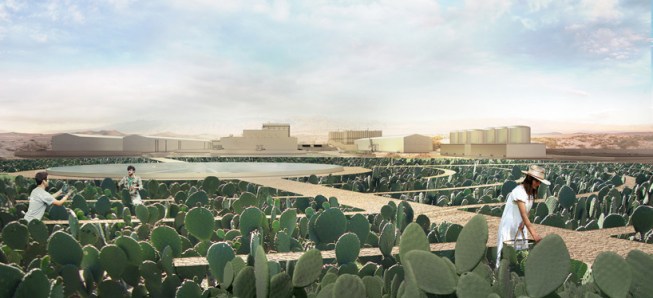Using what she calls “grassroots cactivism,” Los Angeles–based designer Ali Chen utilizes the Nopal Cactus, or commonly referred to as the prickly pear, to offer a solution to California’s issues with water shortage. The drought tolerant plant is suitable for both human and animal consumption. The pulp of the plant can also separate suspended molecules in water and clean up heavy metals dissolved in the liquid, acting as a natural filtration system. Such an application could be adapted to improve existing wastewater management system. In Chen’s proposal, the crop will be divided into two uses: one for harvesting and distribution for human consumption, and the other for hand-processing into food for U.S. exporting.

Ali Chen
At our cactus farm we propose to use this low-tech solution to improve and revolutionize existing wastewater management systems, as well as mitigate water usage in farming by supplying a crop that requires little to no water.
The hybrid farm aims to become an eco-resort, as well. The resort features various activities, such as cooking workshops, fine dining, a water museum, and other amenities. In creating this site, the designer hopes to raise awareness regarding water use, provide funding for research, and increase demand for a crop that could replace other water intensive forms of vegetation.
Chen’s design was submitted in response to archinect’s “dry futures” competition, which called for projects that used architecture as a primary role in creating water use infrastructure. Chen won the “speculative” portion of the contest, which included proposals that may have used technologies not yet in existence, or imagined a futuristic scenario. While California’s current legislation requires individuals to reduce their water use, Chen’s proposal reaches beyond the individual to reach more institutional organizations.
Ali Chen
